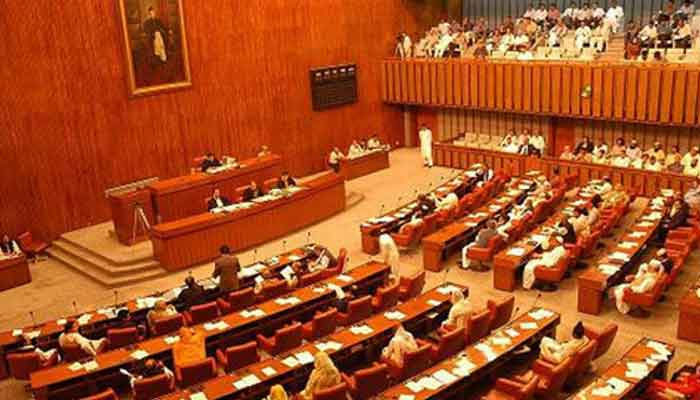Senate panel rejects FBR proposal to raise GST on tier 1 retailers
All the senators also agreed with the presentation and the FBR had zero logic
ISLAMABAD: The Senate Standing Committee on Finance has rejected the FBR proposal in totality for increasing sales tax on POS connected tier-1 retailers from 15 to 18 percent in the budget for 2024-25.
The Pakistan Retail Business Council (PRBC), led by Ziad Bashir, made a representation to the Senate Standing Committee on Finance for not raising the sales tax on POS connected retailers from 15 to 18 percent.
All the senators also agreed with the presentation and the FBR had zero logic. Bashir told the senators that only 5 percent of retail sector was registered and they keep going after us and not the 95pc which pays zero tax. The documented retail sector was already paying 29pc income tax, 10pc super tax, 15pc dividend tax, 7pc Workers Welfare Fund and workers participation fund, etc, which is already nearly 57pc. This additional 3pc will take us to 60pc. The other 95pc retailers pay nothing, he said.
The committee was told that the current taxation system places an undue burden on compliant retailers, who face higher effective tax rates compared to their non-compliant counterparts. Comprehensive reforms are needed to create an equitable tax structure that rewards compliance and penalizes evasion.
Reverting the sales tax rate back to 9pc only for the POS integrated companies, which are under 10pc of the retail sector, will encourage others to get integrated and documented in line with international best practices. Currently, the government has recommended the exact opposite and is increasing the sales tax on POS connected retailers from 15 to 18 percent. “We are already losing market share to the undocumented sector and have been shutting down stores after the last increase. Compared to when the sales tax was at 6 to 9 percent, the POS connected retailers were growing at 25 to 30 percent a year,” said Bashir.
Smuggling remains a critical challenge, undermining the efforts of tax-compliant retailers and causing substantial revenue losses. “Effective measures must be implemented to curb smuggling, including stringent border controls, advanced surveillance technologies and increased penalties for offenders. Collaborative efforts with neighboring countries can also play a crucial role in addressing this issue,” said Bashir.
He said the lack of enforcement against tax non-compliant retailers is a significant concern. “Zero to no enforcement encourages a culture of evasion, disadvantaging those who adhere to tax laws. It is imperative to strengthen enforcement mechanisms, including regular audits and inspections, to ensure all retailers contribute their fair share to the economy. A dedicated task force and a vast mystery shopping programme should be established to focus on identifying and severely penalizing non-compliant entities.”
The high interest rates even after the 150 basis point decrease are prohibitive for retailers to plan any future expansion, which will stagnate future potential revenue for the government.
He said under-invoicing remains a pervasive problem that distorts market competition and erodes tax revenues. Implementing strict regulations and monitoring mechanisms to prevent under-invoicing is essential. Regular cross-checks between declared values and actual market prices can help detect and deter such practices.
To address these issues effectively, the tier-1 retailers proposed the formation of an oversight committee by the government. This committee should comprise representatives from the retail sector, tax authorities and independent experts. “Its mandate would include monitoring compliance, advising on policy reforms and ensuring transparent and fair enforcement of tax laws. The committee’s insights and recommendations would be invaluable in creating a more robust and equitable taxation framework.”
Bashir said addressing these challenges requires decisive action and collaboration between the government and the retail sector. “By implementing these reforms, we can foster a fair, competitive, and thriving business environment that benefits all stakeholders.”
-
 King Charles ‘very Much’ Wants Andrew To Testify At US Congress
King Charles ‘very Much’ Wants Andrew To Testify At US Congress -
 Rosie O’Donnell Secretly Returned To US To Test Safety
Rosie O’Donnell Secretly Returned To US To Test Safety -
 Meghan Markle, Prince Harry Spotted On Date Night On Valentine’s Day
Meghan Markle, Prince Harry Spotted On Date Night On Valentine’s Day -
 King Charles Butler Spills Valentine’s Day Dinner Blunders
King Charles Butler Spills Valentine’s Day Dinner Blunders -
 Brooklyn Beckham Hits Back At Gordon Ramsay With Subtle Move Over Remark On His Personal Life
Brooklyn Beckham Hits Back At Gordon Ramsay With Subtle Move Over Remark On His Personal Life -
 Meghan Markle Showcases Princess Lilibet Face On Valentine’s Day
Meghan Markle Showcases Princess Lilibet Face On Valentine’s Day -
 Harry Styles Opens Up About Isolation After One Direction Split
Harry Styles Opens Up About Isolation After One Direction Split -
 Shamed Andrew Was ‘face To Face’ With Epstein Files, Mocked For Lying
Shamed Andrew Was ‘face To Face’ With Epstein Files, Mocked For Lying -
 Kanye West Projected To Explode Music Charts With 'Bully' After He Apologized Over Antisemitism
Kanye West Projected To Explode Music Charts With 'Bully' After He Apologized Over Antisemitism -
 Leighton Meester Reflects On How Valentine’s Day Feels Like Now
Leighton Meester Reflects On How Valentine’s Day Feels Like Now -
 Sarah Ferguson ‘won’t Let Go Without A Fight’ After Royal Exile
Sarah Ferguson ‘won’t Let Go Without A Fight’ After Royal Exile -
 Adam Sandler Makes Brutal Confession: 'I Do Not Love Comedy First'
Adam Sandler Makes Brutal Confession: 'I Do Not Love Comedy First' -
 'Harry Potter' Star Rupert Grint Shares Where He Stands Politically
'Harry Potter' Star Rupert Grint Shares Where He Stands Politically -
 Drama Outside Nancy Guthrie's Home Unfolds Described As 'circus'
Drama Outside Nancy Guthrie's Home Unfolds Described As 'circus' -
 Marco Rubio Sends Message Of Unity To Europe
Marco Rubio Sends Message Of Unity To Europe -
 Savannah's Interview With Epstein Victim, Who Sued UK's Andrew, Surfaces Amid Guthrie Abduction
Savannah's Interview With Epstein Victim, Who Sued UK's Andrew, Surfaces Amid Guthrie Abduction




